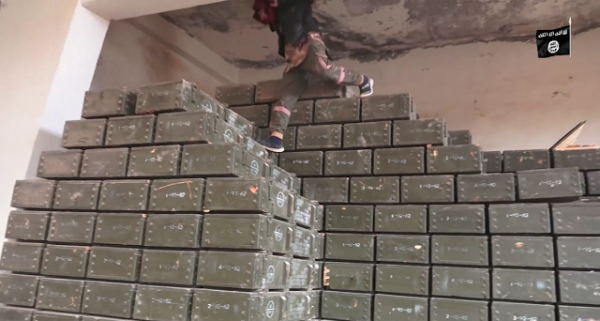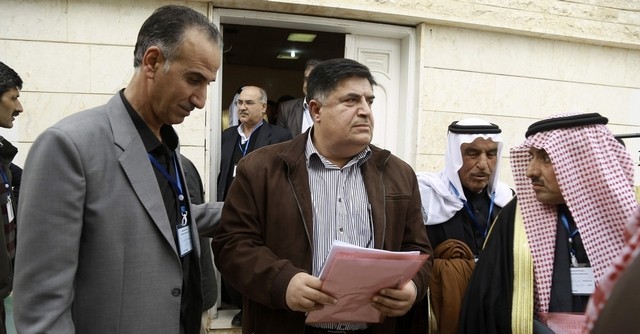PHOTO: Syrian Kurdish officials at Wednesday’s conference in northeast Syria (Delil Souleiman/AFP)
LATEST
- Details: How ISIS Won Largest Weapons Haul of Conflict from Regime
- Putin: We Can Renew Military Presence Within Hours
- How the Ceasefire is Being Monitored
- LCC: Only 20 Deaths in 2 Days
THURSDAY FEATURE
Special: Undercover Stories from Opposition Territory
UPDATE 1800 GMT: As a Kurdish meeting in northeast Syria confirmed its pursuit of a federal system, the Foreign Ministry warned “any party against attempting to undermine the territorial integrity of Syria and the unity of its people under whatever names”.
A Ministry official said this included the 200 Kurdish representatives, led by the Kurdish Democratic Union Party (PYD), gathered in al-Rmeilan city in Hasakah Province in northeast Syria:
Raising the issue of a federation or that of federalization would affect the territorial integrity of Syria, which goes against the Constitution, the national concepts and international resolutions.
Any declaration to that effect would be without any legal value and void of any legal, political, social or economic effect as long as it does not reflect the will of the entire Syrian people with all their political leanings and social spectra, who are all committed to the national unity and territorial integrity of their country.
ORIGINAL ENTRY: Led by the Kurdistan Democratic Union Party (PYD), some Syrian Kurdish groups made a move for federalism on Wednesday.
At a conference in Hasakeh Province in northeastern Syria, the Kurdish representatives said they would issue their statement on Thursday, pointing to a status beyond their current de facto autonomy in three cantons.
Idris Nassan, an official in the Foreign Affairs Directorate of the Kobane canton, said the “Federation of Northern Syria” will mean “widening the framework of self-administration which the Kurds and others have formed”.
Syria’s Kurds have three cantons. Cezire in the northeast and Kobane in the north are already connected along the Turkish border. Afrin is the northwest is detached at the moment, but before the February 27 ceasefire, the YPG took some rebel territory in northern Aleppo Province to close the gap.
Since holding off a four-month Islamic State offensive on Kobane in January 2015, the Kurds have benefited from their success in pushing back ISIS in northern Syria. Last autumn, the US swung most of its support of rebels to the YPG-led Syrian Democratic Forces, which also includes Arab and Assyrian units.
A Developing Russia-PYD Alliance
The step appears to be part of a developing alliance between the PYD and Russia. The Kurdish organization has opened an office in Moscow, and Russia has called for PYD representatives to be present at political talks, which resumed this week in Geneva. Last month, the Russians proposed a federal system in which Kurdish groups would gain authority from the center in Damascus.
Moscow has gone as far as airstrikes to support the YPG’s offensives against rebel territory last month.
Despite its reliance on Russia, the Assad regime immediately denounced the federal proposal, as did its other main ally, Iran. UN Ambassador Bashar al-Jaafari, the head of the regime delegation in Geneva, said, “The Syrian Kurds are an important component of the Syrian people … So betting on creating any kind of divisions among the Syrians will be a total failure,” he said.
The development brought a rare alliance between the regime and its opponents. Turkey is hostile to any boost to the position of the PYD, which has emerged as a leading Kurdish force because of its YPG militia.
Ankara believes that the PYD is led by the Turkish Kurdish insurgency PKK, which has fought an armed campaign against Ankara for more than 30 years.
A Turkish Foreign Ministry official summarized Ankara’s objections on Wednesday, “Syria’s national unity and territorial integrity is fundamental for us. Outside of this, unilateral decisions cannot have validity.”
The opposition-rebel bloc has also been sceptical of the proposal, with coordinator Riad Hijab saying, “Any mention of this federalism or something which might present a direction for dividing Syria is not acceptable at all.”
US Reacts Cautiously
The US State Department reacted with caution, rejecting any unilateral move but holding open the federal option if it were accepted by Syrians:
Spokesman Mark Toner said at his Wednesday press briefing:
We won’t recognize any kind of…self-ruled, semi-autonomous zones in Syria….We have been very clear about our belief in the territorial integrity and unity of Syria and we believe that the creation of these kinds of semi-autonomous zones now…would frankly be a threat to that.
However, asked if the US would agree to a federal structure for Syria if this was chosen by the Syrian people, the spokesman replied: “Yes.”
Details: How ISIS Won Largest Weapons Haul of Conflict from Regime
The Oryx blog details the biggest arms haul of the war, in the Islamic State’s capture of the Ayyash weapons depot from the regime in January.
Pro-regime outlets claimed that the stocks of the depot, in Deir ez-Zor Province in eastern Syria, had been moved before the ISIS takeover. However, an ISIS video of its offensive has displayed at least 2 million rounds of small arms ammunition, 9000 grenades, a hundred anti-tank guided missiles, three tanks, six BMP armored personnel carriers, and dozens of other vehicles.
The figures are conservative because the content of 2,600 crates could not be identified.
The Islamic State claims in the video that it killed or injured 400 regime troops and captured another 100. It says four tanks and 10 BMPs were among the captured vehicles and that 30 rocket launchers were also seized.

Oryx summarizes:
The fact that the contents of the weapons depot were left wholely intact both prior to and after the takeover — contents which could either have been destroyed beforehand or with artillery and airstrikes afterwards — indicates that the Syrian Arab Army is still incapable of dealing with such situations.
Abducted Japanese Journalist Appears in Video
Japanese journalist Junpei Yasuda, abducted last summer, has appeared in a video with a message to his family.
“I want to hug you, I want to talk with you, but I can’t anymore,” Yasuda said in the first direct public evidence that he is still alive.
Yasuda gave no details about his captors. His employer, State broadcaster NHK, said it had spoken with the man who posted the video but gave no further information.
Putin: We Can Renew Military Presence Within Hours
Three days after suddenly declaring withdrawal of “most” Russian forces, President Vladimir Putin has said that Moscow can restore its presence in Syria again within hours.
Putin told more than 700 members of the military at a Kremlin awards ceremony that he hoped that political talks would succeed, but that he was ready to resume operations:
If necessary, literally within a few hours, Russia can build up its contingent in the region to a size proportionate to the situation developing there and use the entire arsenal of capabilities at our disposal.
He said that Russian operations against “terrorist” groups will continue: “I’m sure that we will see new and serious successes in the near future,”
The President expressed hope that the ancient city of Palmyra, captured by the Islamic State last May, will soon be retaken by regime forces: “I hope that this pearl of world civilization, or at least what’s left of it after bandits have held sway there, will be returned to the Syrian people and the entire world.”
Putin said the operations had cost 33 billion rubles ($481.89 million), with most of the expenditure taken from the Defense Ministry’s war games budget. He said there will be more costs to replace ammunition and weapons and to make repairs.
The President warned that the advanced S-400 air defense system remained in place at the Hmeimim base in western Syria that and he would not hesitate to shoot down “any target” which violated Syrian airspace.
How the Ceasefire is Being Monitored
Writing for Vice News, Sam Heller describes how the Syrian ceasefire is being monitored by the US, Russia, and the UN: “There are separate hotlines for the State Department, for the Russians in Moscow and at their Khmeimim airbase near the Syrian city of Latakia, and for the UN-run Operations Centre in Geneva….
American and Russian diplomats been holding both regular and ad hoc calls, [a] diplomat said, and both sides have lines of communications that range from membership in the Geneva-based Ceasefire Task Force to direct channels between the State Department and Russian diplomats and military officials directing operations in Syria.
Heller describes an apparent success with a sudden halt to attacks by pro-Assad forces on Harbnafsah in Hama Province — despite an incident in which the operator of the State Department’s hotline struggled with Arabic and effectively listed the town as “Pepsi War”:
Even as the operator garbled Harbnafsah’s name, the US official said efforts to halt fighting in the town were underway. And Syrians in Harbnafsah and surrounding areas…said that between Wednesday, March 2, and Thursday, March 3, fighting was basically turned off overnight.
However, a local source in Syria casts a different light over the monitoring system, asking why if it could check the fighting in Harbnafsah, it could not do so over the pro-regime attacks in northern Latakia Province and in the al-Marj area — where neither the Islamic State or Jabhat al-Nusra is located — northeast of Damascus.
LCC: Only 20 Deaths in 2 Days
Amid the February 27 cessation of hostilities, the Local Coordination Committees reports have deaths have fallen to only 20 in two days.
The LCC recorded nine casualties on Tuesday and 11 on Wednesday.

